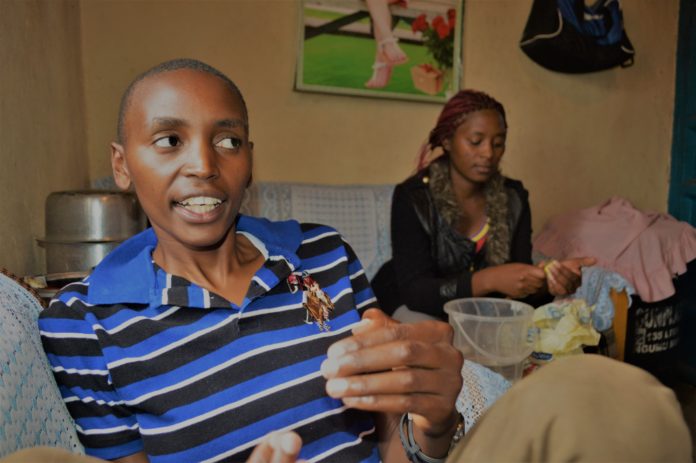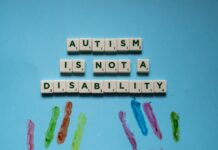By Winnie Kamau

“I hate the day I was born. It marks the beginning of all the confusion and suffering I have had in my 27 years of life. I have never celebrated any birthday,” regretted Ryan Muiruri during the interview.
Muiruri, an intersex activist in Kenya is fighting for the recognition as the third gender in the country.
Intersex is a complex biological condition where children are born either with two sex organs (male and female ) or one visible organ while the other is either hidden, malformed or deformed but present.
Muiruri was born in a small village in the heart of Kiambu County, Central Kenya. When Muiruri’s father inquired about the sex of his new child, the midwife fell silent, confused by the baby’s display of both male and female organs. On that day, Ryan was named Ruth.
Muiruri was brought up as a girl by his grandmother. He was taken to the salon, had his ears pierced, and wore girls’ dresses. His challenges began when “Ruth” hit puberty.

“I was not comfortable in the company of girls, and I was becoming more masculine as my voice was breaking,” Muiruri reflected on his years as Ruth. His lack of feminine traits made him the talk of the village.
“Ruth, you look like a boy,” was a common taunt Muiruri heard on his way to and from school. Faced with the reality of his biological progression, he eventually dropped out for a time.
When he was later admitted to a high school for girls, the psychological pressure became overwhelming.
Muiruri’s mother took him to a mixed gender school in hopes that he would fit in, but this caused more trouble when “Ruth” received love letters from girls and was called a lesbian.
“At school, the taunting and roughing up by fellow boys was too much to bear,” Muiruri said. “They wanted to see what was between my legs.”
Muiruri became a laughing stock in the village and holed up at home, trying to hide from the stigma. He says he attempted suicide five times.
“I tried looking for death by committing suicide, but death could not accept me,” he said. “I believed now I was an outcast because death also ran away from me.”
In the local Kikuyu culture, boys are customarily circumcised at 13. Muiruri wanted to undergo the ceremony, but his family objected. Overwhelmed and confused, he sought medical help.
Muiruri visited a gynaecologist who gave him hormone replacement therapy to bring out feminine features. Muiruri’s breasts grew as his beards and husky voice receded. Tormented by the changes, Muiruri experimented with drugs and alcohol to drown his sorrows.
At 18, once again displaying more masculine physical features and traits, Muiruri received a national identity card bearing the name Ruth.
“I went to one of the banks in my hometown to do a transaction. On presenting my ID, the teller called the police, accusing me of impersonation,” Muiruri said of the incident.
Muiruri was arrested and detained for several hours. After making a few calls to GAM Africa, an organization that champions the rights of intersex people in Kenya, he was release.
Muiruri began using the name Ryan in 2008. His family finally accepted his new name in December 2016, giving him their blessing. Now he is fighting for the inclusion of a third gender option on official state documents in Kenya.
Muiruri says his story echoes that of over 20,000 intersex people in the country, a number in line with estimates from the advocacy group Child Rights International Network.
Many intersex people are assigned male or female at birth and undergo genital reshaping surgery only to arrive at puberty and display physical traits more commonly associated with the opposite sex.

Dr. Ahmed Kalebi of Lancet Kenya recommends that intersex people undergo karyotype tests to determine their dominant sex chromosomes, especially when they are young. Kalebi, who has performed many of these tests at his labs, supports the inclusion of a third gender option for intersex people.
“We no longer call it intersex but Disorders of Sex Development,” Kalebi said, citing a term some activists consider controversial for its medicalization of intersex traits.
Following chromosomal tests and physical examination, an ultrasound is sometimes performed to determine the body’s internal sexual organs. These tests do not come cheap. Muiruri, who was advised by two private hospitals to undergo such tests, was told they would cost $1,500.
Human rights lawyer John Chigiti advocates for the rights of intersex people and says a government-recognized third gender option should be made legal.
“It’s been a long journey for the intersex, but we have had major gains in the Judiciary,” Chigiti said. “The [Judiciary] have recognised [that intersex people] need a gender.”
In 2007, Richard Muasya, through his lawyer Chigiti lodged the first intersex case in Kenyan courts. He was awarded ksh 500,000 for inhumane treatment suffered while in prison. A second case was lodged in 2013, the judgement of which recognized the needs of intersex people and ordered the government to state their standing on the place of intersex as a legal sex category and give guidelines for sex reassignment surgery.
The National Council of Churches of Kenya (NCCK) has opposed the recognition of a third gender in Kenya’s constitution and advocates that medical tests be performed on intersex people to determine their dominant sex characteristics.
Chair of the NCCK Rev. Canon Rosemary Mbogo says “the divine mandate of the church is to represent God as he is.”
“God is not confused. He created male and female, the male seed giver and the female, the woman. We cannot play God and start assigning other genders,” she said.
Mbogo said if God wanted another gender, he would have alluded to it in the Bible.

” There’s no single example of intersex in the Bible. For the homosexuals it was there, and they chose it out of rebellion,” she said, making scriptural reference to other members of what is sometimes called the LGBTI (lesbian, gay, bisexual, transgender, intersex) community.
Such revelation from the clergy, make it difficult for people like Muiruri to find a sense of identity in the society.
Muiruri, who is currently leading an intersex awareness campaign in Kenya, says the third gender option “other” would help resolve some of the problems intersex people face.
The Intersex Society of Kenya is also asking the government to appoint specialized doctors who understand the needs of intersex people and to appropriate funds for a rescue centre to support intersex children and their families who face threats or persecution.














